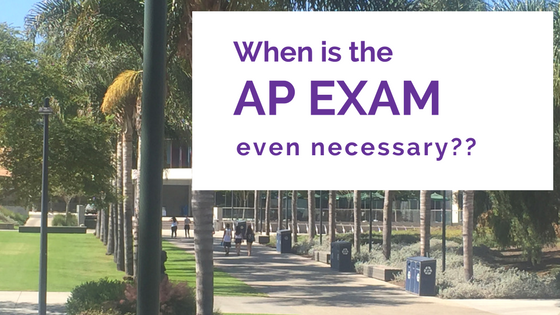Parents often ask me about the importance of taking Advanced Placement courses and the end-of-course AP exams. My best answer is that “it depends” . . .
How many Advanced Placement courses?
 When parents ask me about how many advanced placement courses their teen should take, they are really asking me how many courses their teen should take to “look good” to colleges. Advanced placement courses are about taking a rigorous course load in high school to signal that a student would be academically successful in college.
When parents ask me about how many advanced placement courses their teen should take, they are really asking me how many courses their teen should take to “look good” to colleges. Advanced placement courses are about taking a rigorous course load in high school to signal that a student would be academically successful in college.
Rather than “looking good” to colleges, I believe that students should take the level of courses that are most appropriate for them personally and be true to what their interests are. If a college admits you only because of AP courses you took, it doesn’t say much for how you will fit or thrive at that college.
A reasonable number of AP courses to take is relative to the number of AP courses that your high school offers. Colleges understand that the number of AP courses available vary by high school. If a school offers no AP courses, then students aren’t expected to have AP courses on their transcript. On the other hand, if a high school has a lot of AP courses available, then students should make an effort to take a few AP courses. For example, if a high school offers 10 AP courses and students can take AP courses starting in junior year, then it’s reasonable to have about 3 to 5 AP courses on your transcript. Those AP courses should be in appropriate areas of academic strength for the student . . . if a student is weak in math, it doesn’t make sense to take the AP Calculus courses just for the sake of “looking good” to colleges.

How important is it to take the AP Exam?
In most cases, the AP Exam is not used in college admissions. The exams that students take for college admissions are either the SAT or the ACT. Scores on the AP Exam are most often used to determine the level of courses taken in college. Every college sets its own policies to grant credit for AP level course. For example, at Vanderbilt University in Nashville, a non-engineering student who scores a 4 or 5 on the AP Statistics exam could get 3 credit hours for the Math 1010: Probability and Statistical Inference course. Also, the credit for AP exam scores may not apply towards a major in that same subject area. Complicated, huh?
I have heard many college students say that they regret using their AP credit because they could have benefitted from having that first level course at the college level.
Where I find the AP exam helpful to take is in preparation for an SAT Subject Test. The AP courses are mostly aligned with SAT Subject Tests. If a student, for example, is taking AP US History (APUSH) and plans to take the SAT Subject Test in American History, then it could be good preparation to take the AP US History exam in May and the SAT Subject Test in American History in June!
When are the 2019 AP exams scheduled?
Here’s a schedule of when the AP exams are scheduled in 2019.
AP Test Schedule: Week 1
| TEST DATE | MORNING EXAMS (8 A.M.) | AFTERNOON EXAMS (12 NOON) |
|---|---|---|
| May 6, 2019 |
|
|
| May 7, 2019 |
|
|
| May 8, 2019 |
|
|
| May 9, 2019 |
|
|
| May 10, 2019 |
|
|
AP Test Schedule: Week 2
| TEST DATE | MORNING EXAMS (8 A.M.) | AFTERNOON EXAMS (12 NOON) | AFTERNOON EXAMS (2 P.M.) |
|---|---|---|---|
| May 13, 2019 |
|
|
|
| May 14, 2019 |
|
|
|
| May 15, 2019 |
|
|
|
| May 16, 2019 |
|
|
|
| May 17, 2019 |
|
|
When do AP scores come out?
2019 AP scores will mostly be released in mid-July 2019 .
Good luck!
How is your teen preparing for AP exams?






